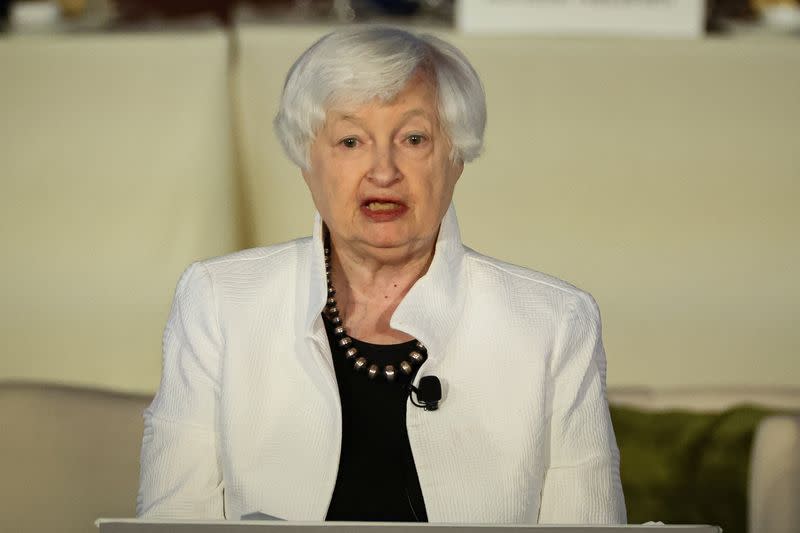US sanctions Mexican cartel on fentanyl, Yellen issues China guidance to banks

By Rich McKay and David Lawder
ATLANTA/WASHINGTON (Reuters) -U.S. Treasury Secretary Janet Yellen on Thursday announced new sanctions on leaders of a Mexican drug cartel involved in trafficking fentanyl and its pre-cursor chemicals into the U.S. as part of a broader push to try to stem the flow of the deadly synthetic opioid.
Yellen announced the sanctions against eight leaders of the La Nueva Familia Michoacana cartel during a trip to Georgia, a key battleground state in the Nov. 5 presidential election.
In addition to fentanyl, Treasury said La Nueva Familia Michoacana traffics cocaine and methamphetamines into the U.S. and smuggles migrants across the southern U.S. border.
Two of the sanctions targets, Rodolfo Maldonado Bustos and Euchlides Chamacho Goicochea, were separately charged by a federal grand jury with crimes related to heroin trafficking, the U.S. Department of Justice office in Atlanta said. Both of the men are fugitives believed to be residing in Mexico, it said.
The Treasury said Bustos, aka "Don Jose," is next in line to the co-leaders of La Nueva Familia Michoacana, while Goicochea works closely with Bustos to distribute drugs in Atlanta and Houston, among other areas.
The sanctions cut the targets off from the dollar-based financial system and freeze any assets that they may have in the U.S. or in U.S.-based institutions.
Yellen also announced a new supplemental advisory to banks from the Treasury's Financial Crimes Enforcement Network (FinCEN) to help them identify and report suspicious transactions related to procurements of fentanyl precursor chemicals and manufacturing equipment by Mexico-based criminal organizations from China.
Reporting of such transactions will help FinCEN and partner agencies track down traffickers, Yellen said, calling it an "important step" in the fight against fentanyl and other synthetic opioids.
"This allows us to follow the money behind the illicit fentanyl supply chain and go after the criminals perpetrating and profiting off of the opioid epidemic," Yellen said at the Richard B. Russell Federal Building in Atlanta.
The new guidance includes "red flags" for banks and other counterparties, including transactions linked to chemical and pharmaceutical companies in China or Hong Kong, or a vendor on an e-commerce or "darknet" site using Chemical Abstracts Service numbers to identify offerings.
Mexican companies with little or no online presence or that predominantly do business with Chinese chemical or pharmaceutical companies also should be treated with suspicion, according to the guidance.
Yellen also called for increased cooperation with Mexico on curbing trafficking of fentanyl and its precursor chemicals, and said the Biden administration would emphasize this in its engagement with Mexican President-elect Claudia Sheinbaum.
Yellen traveled to Mexico in December to try to boost cooperation to counter fentanyl flow into the United States, including through a new counter-fentanyl "strike force" that includes all U.S. Treasury resources, including the Internal Revenue Service's Criminal Investigations unit.
In November, U.S. President Joe Biden and Chinese President Xi Jinping agreed in a meeting near San Francisco to cooperate on curbing illicit trade in fentanyl precursors. But in April, a U.S. congressional committee's investigation found that China was directly subsidizing production of these chemicals through tax rebates.
(Reporting by David Lawder in Washington and Rich McKay in Atlanta; Editing by Andrea Ricci and Bill Berkrot)


